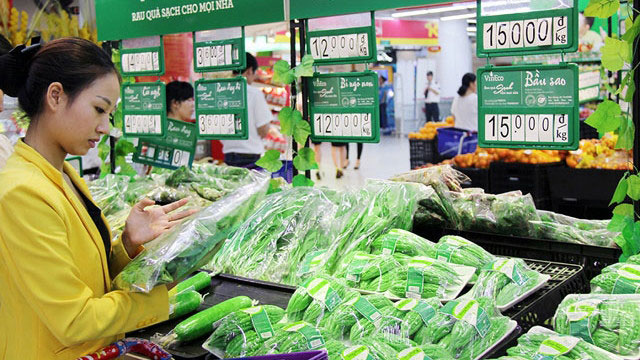



The prices of food and foodstuffs are showing signs of growing after a period of relative stability. (Photo: Bao Dau Tu).
Among the factors expected to have an impact on Vietnam’s inflation towards the end of the year, rising oil prices are considered the largest external factor. Brent oil’s surge to over US$80 a barrel and jumping natural gas prices have prompted many financial institutions in Wall Street to predict faster-than-expected energy price rises.
With fresh US sanctions on Iran, many organisations have forecast that WTI oil prices could rise to US$90 a barrel and even US$100 in the remaining months of the year, leading to price increases in the goods affected by oil prices.
A second major factor is the escalating trade war between the major economies, with several leaning towards devaluing their local currencies in order to minimise damage. In this context, the Vietnamese economy will be adversely affected due to exchange rates becoming unpredictable in the near future.
It is worth noting that the US Federal Reserve is scheduled to raise its interest rates one more time this year, which is expected to strengthen the US dollar and induce the Vietnamese dong to depreciate further. Higher exchange rates will surely affect domestic prices considerably as imports will be more expensive, leading to higher prices of other goods. Higher costs of imported materials will also result in costlier end products.
Domestically, the prices of food and foodstuffs are showing signs of growing after a period of relative stability. Pork prices, for instance, fell sharply last year, making many pig farmers reluctant to increase their stock this year, which has caused a shortage and triggered pork prices to increase strongly in recent months.
Inflation is one of the four key economic objectives, in addition to growth, balance of payments and unemployment. Therefore the developments of the CPI need to be monitored closely in order to introduce timely measures. It is necessary to strengthen price management and stabilisation in order to curb inflation and achieve the goal of macroeconomic stability.
Year-end is usually a sensitive time for exchange rates, the forex market, oil prices and so forth, therefore it is necessary to follow the international financial and monetary situation closely in order to adopt appropriate policy responses to curb inflation effectively.
Moreover, as the demand for loans increases towards the end of the year, it is necessary to regulate credit growth at a reasonable level and ensure the quality of credit. Price regulation in the final months of 2018 should also aim to support growth, avoid creating inflation expectations or lags into subsequent years. The most important orientation in price regulation is to follow the law of supply and demand closely.